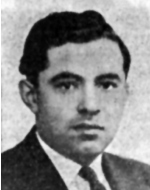Jacob, son of Rachel and Reuven, was born on February 2, 2121, in Poland, where his parents emigrated to Belgium and grew up in Antwerp where he received a religious education and studied Hebrew and Yiddish, And on the eve of World War II, about 65,000 Jews lived in Belgium, and only a tenth of the Jews were Belgian citizens, and the rest were immigrants from Eastern Europe and Germany.The many immigrants who arrived in the country were organized in congregations, synagogues and independent organizations. In May 1940, two official branches of Belgian government were created, with various tendencies: the government in exile in London, which stood alongside B During the period of German rule, many anti-Jewish decrees were issued in Belgium, and Jews were fired from their public positions, their movement restricted and they were deprived of economic life. The majority of the Jews were forced to work in the fortification factories along the coast of northern France, and later were sent to extermination.The deterioration in the social and economic situation had a severe impact on the Jewish community and created a gap between Belgian Jews and other Jews. Implementation of the “Final Solution” on the Jews of Belgium began in the spring of 1942. At the end of July 1942, the concentration of Jews in the Mechelen camp began, and many were sent to labor camps. The deportations continued until September 1943. Most of the deportees perished in Auschwitz. Small groups were sent to the Buchenwald, Ravensbrueck and Bergen-Belsen camps. A total of 35,000 Belgian Jews were arrested and deported, most of whom perished. Jacob’s entire family was taken to internment and extermination camps and murdered. He was the only one who survived, after being held for three years in a torture camp. After the liberation he returned to Brussels, where he moved to Antwerp and waited for permission to enter the United States, where his aunt lived, his only surviving relative. During the decrees he had learned to adapt to all living conditions, but his decision was firm-to abandon the damn continent where he had lost all that was dear to him. The struggle against the British and the Arabs in the country, and the beginning of the War of Independence that began here, aroused Jacob, who was still in Belgium and waited for exit permits, to feel the homeland. From Belgium he moved to France, joined Machal (foreign volunteers) and arrived in Israel on July 12, 1948. On board the ship he served as an interpreter, speaking eight languages on this ship, and his knowledge of Hebrew was very helpful. He was trained as a paramedic and was very successful in his battles as a company paramedic, and his relatives in the United States sent enthusiastic letters from Israel, although he stressed that “he did not come here for fun.” In November 1948, Yaakov fought with his unit in the south, Iraq Al-Manshiya was an Arab village located near an ancient tell (now Tel Irani, near Kiryat Gat) and became an Egyptian fortified area, part of a “pocket” Luigia “in which thousands of Egyptian soldiers were captured after a summer of Independence. The Egyptian forces were established near the road between Majdal (now Migdal) and Beit Jovrin (now Beit Guvrin), in order to connect the axis of their invasion of the coastal plain with their forces in the Hebron Hills. The Egyptian fortification system severed the Negev from the nascent State of Israel and endangered the nearby Jewish settlements. Thus, several attempts were made to capture Iraq Al-Manshiya, including Operation “Yoav” in October 1948, but were unsuccessful. On the 25th of Cheshvan 5709 (25.11.1948), Yaakov participated in a battle of his unit in the area of Iraq al-Manshiyya. During the battle, when he felt he was being treated, he was hit by a bullet in the head and killed. The area of Iraq al-Manshiya returned to Israeli control after Operation HorevThe fire with Egypt in January 1949. Yaakov was twenty-seven years old in his fall. He was laid to rest in the military cemetery in the village of Warburg. This hero is a “last scion”. The survivors of the Holocaust are survivors of the Holocaust who survived the last remnant of their nuclear family (parents, brothers, sisters, sons and daughters) who experienced the Holocaust in the ghettos and / or concentration camps and / or in hiding and hiding in territories occupied by the Nazis and / Or in combat alongside members of the underground movements or partisans in the Nazi-occupied territories who immigrated to Israel during or after World War II, wore uniforms and fell in the Israeli army.
